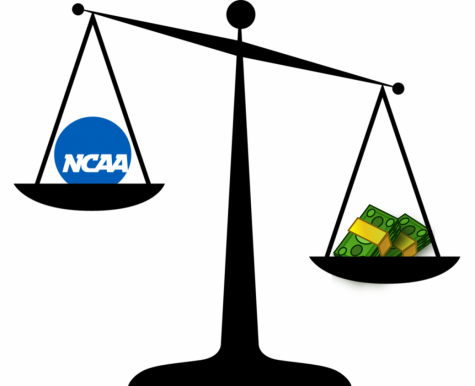Kick Back with Kushal: California does right by collegiate athletes
October 16, 2019
On Sept. 30, free labor in California’s college athletics programs finally came to a close with California’s newly instituted “Fair Pay to Play Act,” also known as Senate Bill 206. Of course, while students can’t expect anything like Stephen Curry’s $37.46 million annual salary from their schools — in fact, they won’t get any salary whatsoever — they can finally earn compensation from endorsements or outside activities such as teaching skill-based workshops for kids. Although this bill won’t help Harker alum and recipient of the 2015 Haskins award for top college athlete Maverick McNealy (‘13), who graduated before signing a deal with golf titan Callaway, it paves the way for a more equitable treatment of other exceptional student-athletes in the National Collegiate Athletic Association (NCAA). It’s a change that’s long overdue.
Students in the NCAA work hard, and paying people for their hard work is the right thing to do. According to Business Insider, a recent lawsuit by former college athletes at the University of North Carolina detailed that they spent more than 40 hours per week at practice — the equivalent of a full-time job! A 2015 NCAA study backed up their contention: it found that Division I players in baseball, basketball and football average 40, 34 and 41 hours per week, respectively. These players work day and night, honing their craft. Do we expect medical residents to work for free? Why should student-athletes be any different?
Moreover, students earn astronomical sums for the NCAA and their schools; so why can’t they have at least a crumb? Just in 2017, according to the unaudited financial breakdown that the organization released, the NCAA reported close to $1 billion in total revenue, mainly from the men’s basketball tournament.
Meanwhile, colleges and universities earn piles of money from merchandising, television contracts and ticket sales. In 2017, the University of Texas earned $215 million from its athletics programs according to its annual finance report sent to the NCAA. In 2018, the University of Alabama’s football program alone had revenues of $108.2 million. Isn’t it hypocritical for these organizations to frown on students earning money while they line their own pockets at the same time?
Allowing student-athletes to be paid will also help secure these students’ futures, especially if they should become injured in college. After all, playing college sports is a risky business. Perhaps one of the most tragic examples of a player who suffered a career-ending injury is Devon Walker, a former safety for the Tulane Green Wave football team. In a fateful game against the Tulsa Golden Hurricane in his senior year, Walker collided with a teammate and had to be carted off the field due to a loss of movement. Nobody knew the exact severity of Walker’s injury until a shocking revelation came to light –– he would be paralyzed from his neck down for the rest of his life, and he would never be able to play football again. In other words, for all the time and work Walker dedicated to football to have been destroyed within a single game, a single play, a single injury, without any financial gain, is truly agonizing.
Another example of a player whose career ended too soon is Dante Love, a former wide receiver for Ball State, who was likely on every NFL scout’s radar until he suffered a broken neck and a major concussion after he was tackled by two Indiana Hoosier defenders. Unfortunately, as a result, these injuries would keep Love from pursuing his football dream of playing in the NFL and from earning a single cent despite all the practice and time he dedicated to his craft.

College is also an ideal time for athletes to start earning money because they are in a supportive environment that can teach them how to manage their money and their professional careers. Consider basketball legend Allen Iverson, who earned over $200 million in his 15-year NBA career and nearly blew it all; there are numerous other athletes who struggle to make wise financial decisions.
Hall of Famer Shaquille O’Neal is another similar example as he frequently bemoans his own financial mistakes on TNT. Instead of fighting student-athletes’ right to earn money, schools should educate them with business classes and financial seminars, giving them a solid foundation from trusted educators.
I do concede that the new law doesn’t come without its detractors. Opponents argue that the ability to earn money will be distracting, and that on a practical level, it could lead to California being expelled from the NCAA.
Recently the famed former football coach of Ohio State University Urban Meyer articulated the common argument about losing “the purity of college athletics.” What does that even mean? The idea that college athletes are somehow motivated by a nobler sense of competition than their professional counterparts, that money taints their perfect morals, isn’t credible in an atmosphere where the programs are soaking in the financial benefits of the free labor that college athletes provide them. Objections about purity went out the window when NCAA president Mark Emmert cashed in his $2.4 million paycheck and when Meyer himself received a $7.6 million paycheck in 2018.
For the past few weeks, the NCAA has been threatening to expel California schools from the organization altogether if the bill passes. But I’m relieved that this didn’t dissuade Governor Gavin Newsom from doing the right thing and signing SB-206 into law. Other states such as Washington and Colorado that are part of the Pac-12, the collegiate athletic conference that operates in the Western United States and participates in numerous sports at the NCAA Division I level, are already following California’s example. To clarify, this essentially means that the conference will simply become the best, most highly-followed conference in the country as the brightest athletic stars will no doubt flock to it for fair compensation. If the NCAA kicks all these states out of its conference, the NCAA itself risks reduced popularity by its myopic perspective.
So, to the NCAA: please, stop fighting the bill? Instead of threatening to expel California schools from your organization, wouldn’t it be more advantageous to support your athletes in their endeavors? Isn’t that what’s most important here? It’s said that these student-athletes are at the heart of the NCAA’s mission. Prove it. Stop fighting the Fair Pay to Play Act, and help fight for the student athletes that work so hard everyday to make your organization so successful.


















![“[Building nerf blasters] became this outlet of creativity for me that hasn't been matched by anything else. The process [of] making a build complete to your desire is such a painstakingly difficult process, but I've had to learn from [the skills needed from] soldering to proper painting. There's so many different options for everything, if you think about it, it exists. The best part is [that] if it doesn't exist, you can build it yourself," Ishaan Parate said.](https://harkeraquila.com/wp-content/uploads/2022/08/DSC_8149-900x604.jpg)




![“When I came into high school, I was ready to be a follower. But DECA was a game changer for me. It helped me overcome my fear of public speaking, and it's played such a major role in who I've become today. To be able to successfully lead a chapter of 150 students, an officer team and be one of the upperclassmen I once really admired is something I'm [really] proud of,” Anvitha Tummala ('21) said.](https://harkeraquila.com/wp-content/uploads/2021/07/Screen-Shot-2021-07-25-at-9.50.05-AM-900x594.png)







![“I think getting up in the morning and having a sense of purpose [is exciting]. I think without a certain amount of drive, life is kind of obsolete and mundane, and I think having that every single day is what makes each day unique and kind of makes life exciting,” Neymika Jain (12) said.](https://harkeraquila.com/wp-content/uploads/2017/06/Screen-Shot-2017-06-03-at-4.54.16-PM.png)








![“My slogan is ‘slow feet, don’t eat, and I’m hungry.’ You need to run fast to get where you are–you aren't going to get those championships if you aren't fast,” Angel Cervantes (12) said. “I want to do well in school on my tests and in track and win championships for my team. I live by that, [and] I can do that anywhere: in the classroom or on the field.”](https://harkeraquila.com/wp-content/uploads/2018/06/DSC5146-900x601.jpg)
![“[Volleyball has] taught me how to fall correctly, and another thing it taught is that you don’t have to be the best at something to be good at it. If you just hit the ball in a smart way, then it still scores points and you’re good at it. You could be a background player and still make a much bigger impact on the team than you would think,” Anya Gert (’20) said.](https://harkeraquila.com/wp-content/uploads/2020/06/AnnaGert_JinTuan_HoHPhotoEdited-600x900.jpeg)

![“I'm not nearly there yet, but [my confidence has] definitely been getting better since I was pretty shy and timid coming into Harker my freshman year. I know that there's a lot of people that are really confident in what they do, and I really admire them. Everyone's so driven and that has really pushed me to kind of try to find my own place in high school and be more confident,” Alyssa Huang (’20) said.](https://harkeraquila.com/wp-content/uploads/2020/06/AlyssaHuang_EmilyChen_HoHPhoto-900x749.jpeg)











